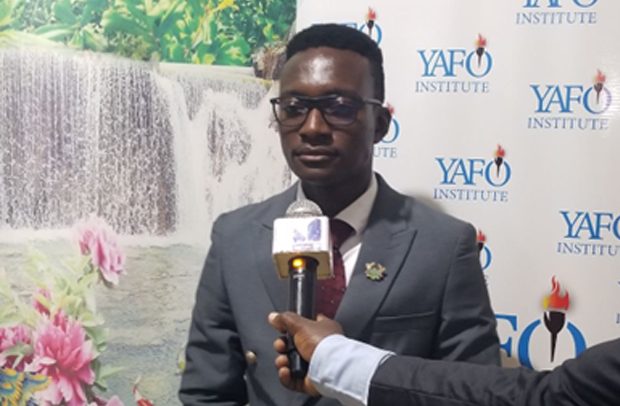Mr. Dwamena addressing the media
President of YAFO Institute, an independent public policy research organization, Nathanial Dwamena, has proposed to government and non-governmental organizations to embrace the use of blockchain technology to stop the various activities of middlemen, also known as ‘goro boys’ who charge exorbitant fees for relatively free services at public places in the country.
Mr. Dwamena’s proposal follows a comments made by the Registrar-General, Jemima Oware, in an interview indicating that middlemen, also known as ‘goro boys’, working at her office are human beings and therefore cannot stop them from operating.
“The goro boys are human beings, they are Ghanaians and I cannot throw them out of my front office.That is why I said that when you get to the front office, deal with the officers who are in the cages who are properly tagged and go through the process yourself,” she said, as quoted by pulseghana.com
Mr. Dwamena however explained that blockchain technology facilitates smart contracts by providing a decentralized and transparent platform for ensuring contract execution is resistant to manipulation. “Immutable records stored on the blockchain provide transparency and verifiability, allowing all participants to audit and validate the contract’s execution.
This is key to eliminating ‘goro boys’ activities for inclusive development,” he said. “Due to the decentralized nature of blockchain, it has many advantages to solving problems like corruption and activities of ‘goro boys’ who frustrate entrepreneurs in the country. A self-executing program known as a smart contract automates the steps necessary to fulfill a contract or agreement. Smart contracts allow transactions, and agreements to be carried out without a third party,” he posited.
Mr. Dwamena made this assertion at a round table policy dialogue on free trade, dubbed “Harnessing Blockchain Technology for Sustainable and Inclusive Free Trade” in Accra.
He believed free trade should not be mere potential for Africa, noting that the percentage of intra-African exports as a share of all African exports is still low around 17% in 2017, compared to levels in Europe (69%), Asia (59%), and North America (31%).
He also added that neighbouring countries such as Ghana and Lagos with just a distance of 470 kilometers are unable to transact businesses as it is intercepted with tiresome border checks, harassment, and requests for kickbacks from officials and high cost of making money transactions affecting the intra-African trade.
Mr. Dwamena also revealed that Africa accounts for 70% of mobile money transactions at a higher cost compared to blockchain technology which allows trade across various countries at a cheaper cost. “It is very imperative for Africans to utilize this potential to improve intra-Africa trading “he added.
BY Prince Fiifi Yorke

